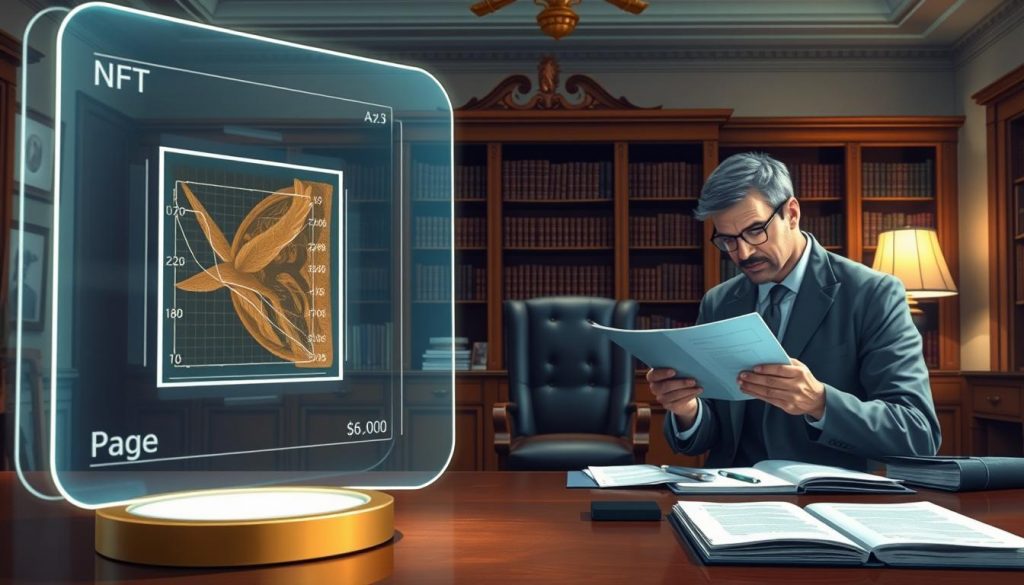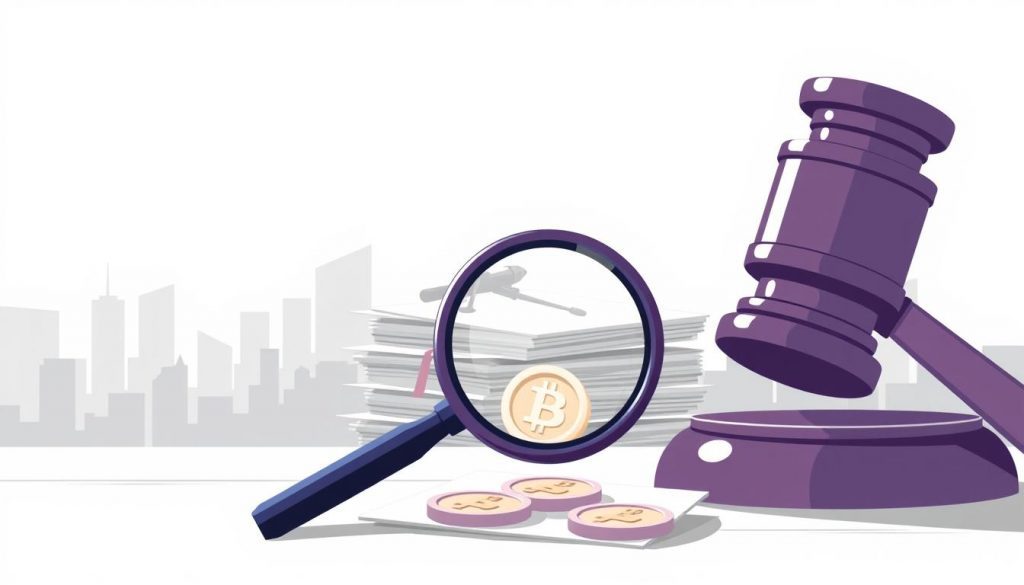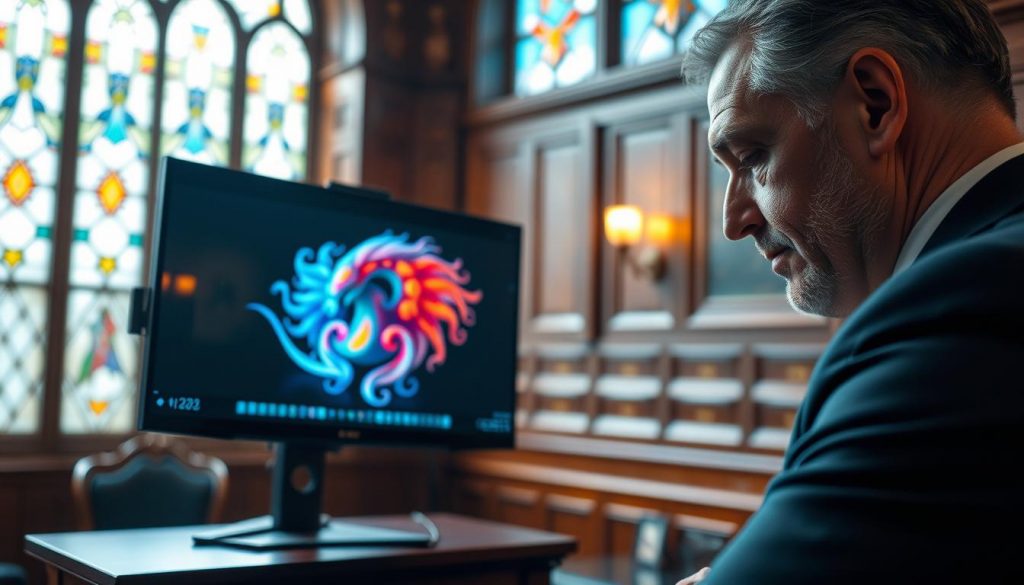As digital assets become increasingly significant in estate planning, understanding their valuation is crucial. We are seeing a growing importance of non-fungible tokens (NFTs) in probate, and it’s essential for individuals to grasp the process.
NFTs, or unique digital assets, are changing the way we think about estate planning. We will guide you through the process of NFT valuation for probate in the UK, ensuring you have the necessary knowledge to protect your family’s assets.
Key Takeaways
- Understanding NFT valuation is vital for effective estate planning.
- Non-fungible tokens are becoming increasingly significant in probate.
- We will guide you through the NFT valuation process in the UK.
- Proper valuation ensures accurate distribution of digital assets.
- Staying informed about NFT valuation can protect your family’s assets.
Understanding NFTs and Their Impact on Probate
The rise of NFTs has introduced a new layer of complexity in probate proceedings, necessitating a deeper understanding of these digital assets. As we navigate the evolving landscape of digital ownership, it’s crucial to comprehend the role NFTs play and their implications for probate valuation services.

What are Non-Fungible Tokens?
Non-Fungible Tokens (NFTs) are unique digital assets that represent ownership of specific items, such as art, music, or other creative works. Unlike cryptocurrencies, NFTs are not interchangeable, making each token distinct and valuable in its own right. This uniqueness is what gives NFTs their value and makes them significant in the context of digital assets valuation.
We see NFTs being used in various ways, from digital art galleries to exclusive in-game items. Their ability to prove ownership and scarcity through blockchain technology has opened new avenues for creators to monetize their work. As a result, NFTs have become a significant aspect of the digital economy.
The Rise of NFTs in Recent Years
In recent years, NFTs have experienced a meteoric rise in popularity, with the market seeing significant growth. This surge has been driven by increased interest from artists, collectors, and investors. The ease of creating and trading NFTs has made it possible for a broader audience to participate in the digital art market.
Some key factors contributing to the rise of NFTs include:
- Increased Accessibility: The technology behind NFTs has become more accessible, allowing more creators to mint and sell their digital assets.
- Market Demand: Growing interest in digital art and collectibles has driven demand for NFTs.
- Blockchain Technology: The use of blockchain ensures the uniqueness and ownership of NFTs, providing a secure and transparent way to trade digital assets.
As NFTs continue to evolve, their impact on probate proceedings becomes more pronounced. Understanding their valuation is crucial for ensuring that these digital assets are properly accounted for in estate planning and probate.
The Importance of Valuation for Probate
Valuing NFTs correctly is vital for probate, as it directly impacts the distribution of the estate and tax obligations. We understand that the process can be complex, but accurate valuation is essential to ensure that the estate is distributed according to the deceased’s wishes and that tax obligations are met.

Why Valuation is Crucial
Accurate NFT valuation is crucial for several reasons. Firstly, it ensures that the estate’s assets are distributed fairly among beneficiaries. Secondly, it helps in meeting tax obligations, as the value of NFTs can significantly impact the overall tax liability. Lastly, it provides a clear financial picture of the estate, aiding in the probate process.
- Ensures fair distribution of assets among beneficiaries
- Helps in meeting tax obligations by accurately assessing tax liability
- Provides a clear financial picture of the estate
Legal Implications of Inaccurate Valuation
Inaccurate NFT valuation can lead to significant legal implications. Overvaluation or undervaluation can result in disputes among beneficiaries, potentially leading to costly legal battles. Moreover, incorrect valuation can lead to non-compliance with tax laws, resulting in penalties and fines.
Inaccurate valuation can lead to:
- Disputes among beneficiaries due to unfair distribution
- Non-compliance with tax laws, resulting in penalties
- Potential legal battles, adding to the estate’s expenses
We recommend consulting with probate valuation experts to ensure that NFTs are valued accurately, avoiding potential legal complications.
Methods of NFT Valuation
The process of valuing NFTs involves multiple methodologies, each with its own strengths and weaknesses. When determining the value of NFTs for probate purposes, it’s crucial to understand these different approaches to arrive at an accurate valuation.
Market Comparison Approach
The market comparison approach is one of the most commonly used methods for NFT valuation. This method involves comparing the NFT in question to similar NFTs that have been sold recently in the market. By analyzing these comparable sales, we can estimate the value of the NFT. For instance, if a particular digital artwork by an artist has sold for a certain amount, we can use this data to value other similar artworks by the same artist.
Key considerations for the market comparison approach include:
- The similarity between the NFT being valued and the comparables
- The recency of the comparable sales
- The credibility of the market data
As noted by a leading expert in NFT valuation, “The market comparison approach provides a snapshot of the current market sentiment towards a particular NFT or artist.”
“The value of an NFT is not just determined by its inherent qualities but also by how the market perceives it at any given time.”
Income Approach to Valuation
The income approach to NFT valuation is based on the potential income that the NFT can generate. This could be through royalties or future sales. By estimating the future cash flows and discounting them to their present value, we can determine the NFT’s value using this method.
A key advantage of the income approach is that it takes into account the potential future earnings of the NFT. However, it requires making assumptions about future market conditions and the NFT’s performance, which can be challenging.
Cost Approach to Valuation
The cost approach to valuation involves determining the cost of creating or replacing the NFT. This method considers the expenses associated with producing the NFT, such as the cost of the digital platform used, the artist’s time, and any other relevant costs.
The cost approach can be particularly relevant for unique or one-of-a-kind NFTs. However, it may not accurately reflect the NFT’s market value, especially if the NFT has appreciated significantly since its creation.
By understanding and applying these different valuation methods, we can ensure that NFTs are accurately valued for probate purposes in the UK, taking into account the unique characteristics of each NFT and the current market conditions.
Factors Affecting NFT Valuation
Understanding the factors that affect NFT valuation is essential for accurate probate assessment. When valuing NFTs for probate, it’s crucial to consider the various elements that influence their worth.
Rarity and Scarcity
The rarity and scarcity of an NFT significantly impact its value. NFTs that are part of a limited edition or have unique characteristics are generally more valuable. We must consider these factors when assessing the value of NFTs for probate purposes.
For instance, an NFT that is one of only a few in existence will typically be more valuable than one that is part of a larger, more common collection. This scarcity can drive up demand and, consequently, the NFT’s value.
Artist Reputation
The reputation of the artist behind an NFT is another critical factor in its valuation. Artists with a strong track record of sales, critical acclaim, or popularity in the art world can command higher prices for their NFTs.
When assessing the value of an NFT, we consider the artist’s standing in the art community, their past sales data, and any other relevant factors that could influence the NFT’s value.
Market Demand and Trends
Market demand and trends play a significant role in NFT valuation. The value of an NFT can fluctuate based on current market conditions, trends in the art and collectibles market, and the overall demand for NFTs.
To accurately value an NFT, we must stay abreast of the latest market trends and demand. This involves analyzing sales data, market reports, and other relevant information to determine the NFT’s current value.
| Factor | Impact on NFT Valuation | Example |
|---|---|---|
| Rarity and Scarcity | Increases value due to uniqueness | Limited edition NFT |
| Artist Reputation | Enhances value due to artist’s standing | NFT by a renowned artist |
| Market Demand and Trends | Fluctuates value based on market conditions | NFT trending in the art market |
In conclusion, the valuation of NFTs for probate is a complex process that requires careful consideration of multiple factors, including rarity, artist reputation, and market demand. By understanding these elements, we can provide a more accurate assessment of an NFT’s value.
The Role of Experts in Valuation
When it comes to NFT valuation for probate in the UK, the expertise of a qualified professional is indispensable. Experts play a crucial role in providing accurate valuations, which are essential for legal and financial proceedings.
Valuation experts bring specialised knowledge and experience to the table, helping to navigate the complex landscape of NFTs. Their expertise ensures that valuations are conducted fairly and in accordance with legal standards.
Qualifications of a Valuation Expert
A competent valuation expert should possess certain qualifications and characteristics. These include:
- Relevant professional certifications in valuation or a related field
- Experience in valuing digital assets, particularly NFTs
- Knowledge of the current market trends and conditions
- Understanding of legal requirements related to probate valuation
As noted by a leading expert in the field, “The valuation of NFTs for probate requires not only an understanding of the digital asset itself but also the legal framework within which it is being valued.”
This highlights the multifaceted role of a valuation expert.
How to Choose a Specialist for NFT Valuation
Selecting the right specialist is crucial for obtaining an accurate NFT valuation. Here are some factors to consider:
| Criteria | Description |
|---|---|
| Professional Affiliations | Membership in recognised professional bodies |
| Experience | Proven track record in NFT valuation |
| Market Knowledge | Up-to-date understanding of the NFT market |
By choosing a qualified expert, individuals can ensure that their NFT valuations are accurate and reliable, facilitating smoother probate processes.

For probate valuation services, it’s essential to work with professionals who understand the intricacies of NFT valuation. This not only ensures compliance with legal requirements but also provides peace of mind during a challenging time.
Tax Considerations for NFT Valuation
Understanding the tax implications of NFT valuation is essential for effective probate planning. As NFTs become increasingly significant in estate planning, it’s crucial to address the tax considerations associated with their valuation.
Inheritance Tax Implications
Inheritance tax is a significant concern when it comes to NFT valuation for probate. In the UK, inheritance tax is levied on the estate of the deceased, including digital assets such as NFTs. The valuation of NFTs for inheritance tax purposes must be accurate to avoid any potential penalties.
Key Considerations for Inheritance Tax:
- The valuation of NFTs must reflect their market value at the time of the deceased’s passing.
- Accurate records of NFT ownership and valuation are crucial for inheritance tax purposes.
- Professional valuation by experts in digital assets valuation may be necessary to ensure compliance.
Capital Gains Tax on NFT Transactions
Capital gains tax is another important consideration for NFT transactions. When NFTs are sold or transferred, any gains made may be subject to capital gains tax. Understanding the tax implications of these transactions is vital for both the estate and the beneficiaries.
Key Points for Capital Gains Tax:
- Capital gains tax is applicable when NFTs are sold or transferred at a value higher than their acquisition cost.
- The tax rate will depend on the individual’s tax bracket and the amount of gain realized.
- Accurate records of NFT transactions, including purchase and sale prices, are essential for calculating capital gains tax.

To illustrate the tax implications of NFT valuation, let’s consider the following example:
| NFT Details | Valuation at Purchase | Valuation at Sale | Capital Gains Tax |
|---|---|---|---|
| NFT Artwork 1 | £1,000 | £5,000 | £800 (20% of £4,000 gain) |
| NFT Artwork 2 | £500 | £2,000 | £300 (20% of £1,500 gain) |
As shown in the table, accurate valuation of NFTs at the time of purchase and sale is crucial for determining capital gains tax. Probate valuation experts play a vital role in ensuring that NFTs are valued correctly for tax purposes.
Challenges in Valuing NFTs for Probate
NFTs present unique challenges when it comes to valuation for probate, largely because of their relatively new and evolving nature. As we navigate the complexities of NFT valuation, it becomes clear that several factors complicate this process.
Volatility of the NFT Market
The NFT market is known for its volatility, with prices fluctuating rapidly due to various factors such as market demand, technological advancements, and changes in consumer preferences. This volatility makes it challenging to determine the accurate value of NFTs at any given time, particularly for probate purposes.
For instance, the value of an NFT can drop significantly if the market becomes saturated with similar assets or if there’s a shift in consumer interest. Conversely, the value can surge if an NFT gains popularity or becomes associated with a significant event or figure. We must consider these fluctuations when valuing NFTs for probate.
Key factors contributing to market volatility include:
- Market speculation and hype
- Technological advancements and changes
- Shifts in consumer preferences and demand
- Economic conditions and global events
Lack of Standard Valuation Practices
Another significant challenge is the lack of standardized practices for NFT valuation. Unlike traditional assets, NFTs are unique digital assets that require specialized knowledge and expertise to value accurately. The absence of universally accepted valuation standards complicates the process, making it difficult to determine a fair and accurate value for probate purposes.
“The lack of standardization in NFT valuation is a significant hurdle. It requires valuers to have a deep understanding of both the digital asset and the market dynamics.”
To address these challenges, we recommend that valuers and estate administrators stay informed about market trends and developments in NFT valuation methodologies. By doing so, they can better navigate the complexities of NFT valuation for probate and ensure that NFTs are valued fairly and accurately.
Case Studies of NFT Valuation in Probate
Examining real-life cases of NFT valuation in probate can provide invaluable insights into the complexities of digital asset inheritance. As probate valuation experts, we have observed that the unique characteristics of NFTs present both challenges and opportunities in the probate process.
High-Profile NFT Valuation Cases
Several high-profile cases have highlighted the importance of accurate NFT valuation in probate. For instance, the estate of a renowned digital artist recently faced significant challenges in valuing their NFT collection due to the volatile nature of the digital art market. The complexity of this case underscores the need for specialised expertise in NFT valuation.
Another notable case involved a family dispute over the valuation of an NFT inherited from a deceased relative. The disagreement centred on the methodology used to determine the NFT’s value, highlighting the importance of selecting the appropriate valuation approach. We will explore these cases in more detail below.
- A high-profile NFT sale was contested due to disagreements over its valuation for probate purposes.
- A family trust was established to manage a collection of NFTs, requiring precise valuation for tax purposes.
- A digital artist’s estate was subject to a thorough audit, necessitating expert digital asset inheritance valuation.
Lessons Learned from Notable Cases
These cases offer valuable lessons for probate valuation experts and individuals dealing with NFT inheritance. Firstly, the importance of accurate and up-to-date valuations cannot be overstated. The rapidly changing nature of the NFT market means that valuations can fluctuate significantly over short periods.
Secondly, the selection of the appropriate valuation methodology is critical. Whether using the market comparison approach, income approach, or cost approach, it’s essential to choose the method that best reflects the NFT’s true value. Expert guidance is often necessary to navigate these complex decisions.
Finally, transparency and clear communication are vital when dealing with NFT valuations in probate. Ensuring that all parties understand the valuation process and the factors influencing the NFT’s value can help prevent disputes and ensure a smoother probate process.
Preparing for Probate: Essential Steps
As we navigate the probate process, it’s vital to take the necessary steps to ensure accurate NFT valuation. Preparing for probate involves several crucial tasks that help ensure a smooth process.
Documenting NFT Ownership
One of the critical steps in preparing for probate is documenting NFT ownership. This involves gathering all relevant records that prove ownership of the NFTs. We recommend keeping detailed records of:
- Purchase receipts and transaction history
- Wallet addresses and private keys
- Details of the NFT, including its name, description, and unique identifier
- Any other relevant documentation related to the NFT
Having comprehensive documentation in place can significantly simplify the probate process. For more information on handling digital assets during probate, you can visit Swansea Legal Solutions to understand how online accounts are handled.
Gathering Relevant Valuation Evidence
Gathering relevant valuation evidence is another essential step in preparing for probate. This involves collecting data that supports the valuation of the NFTs. We suggest gathering:
- Recent sales data of similar NFTs
- Market trends and analysis reports
- Appraisals from reputable NFT valuation experts
- Any other relevant market data that could impact the NFT’s value
By gathering comprehensive valuation evidence, we can ensure that the NFTs are accurately valued, which is crucial for the probate process. As emphasized by experts, “Accurate valuation is key to a fair and efficient probate process.”
Ensuring that we have all the necessary documentation and evidence in place not only streamlines the probate process but also helps in avoiding potential disputes or complications. By taking these essential steps, we can protect the interests of all parties involved and ensure that the probate process is handled efficiently.
Future Trends in NFT Valuation for Probate
The future of NFT valuation for probate is closely tied to developments in the broader NFT market and technological innovations. As the NFT landscape continues to evolve, understanding these changes will be crucial for accurate valuation in probate cases.
Impact of Technological Advancements
Technological advancements will play a significant role in shaping the future of NFT valuation. We can expect improvements in:
- Blockchain technology: Enhancing transparency and security in NFT transactions.
- Artificial Intelligence (AI): AI can help in analyzing market trends and predicting the value of NFTs more accurately.
- Digital asset management platforms: These platforms will simplify the process of documenting and valuing NFTs for probate.
Predictions for the NFT Market and Probate
As the NFT market continues to mature, we predict several trends that will impact probate valuations:
| Trend | Description | Impact on Probate |
|---|---|---|
| Increased regulation | More clear guidelines on NFT valuation and ownership. | Simplified valuation process, reduced disputes. |
| Market stabilization | Less volatility in NFT prices. | More accurate valuations, reduced need for frequent updates. |
| Technological integration | Better tools for NFT valuation and management. | Efficient and accurate valuations, improved record-keeping. |
By staying informed about these trends and leveraging technological advancements, we can ensure that NFT valuations for probate are conducted with the utmost accuracy and efficiency.
Conclusion: Key Takeaways for NFT Valuation in Probate
Understanding non-fungible token valuation is crucial for effective probate in the UK. As we’ve discussed, accurate valuation is essential for ensuring that NFT assets are distributed correctly among beneficiaries.
The process of NFT valuation for probate involves several key considerations, including market demand, artist reputation, and the rarity of the token. By understanding these factors and following best practices, individuals can ensure that their NFT assets are valued accurately.
Essential Points for Accurate Valuation
To achieve accurate non-fungible token valuation, it’s essential to work with experienced professionals who understand the complexities of the NFT market. Additionally, staying up-to-date with market trends and using multiple valuation methods can help ensure a fair and accurate UK probate valuation.
Best Practices for NFT Valuation
By following best practices, such as documenting NFT ownership and gathering relevant valuation evidence, individuals can navigate the complex process of NFT valuation with confidence. We recommend seeking expert guidance to ensure that NFT valuation is handled correctly, protecting the interests of all parties involved in the probate process.


